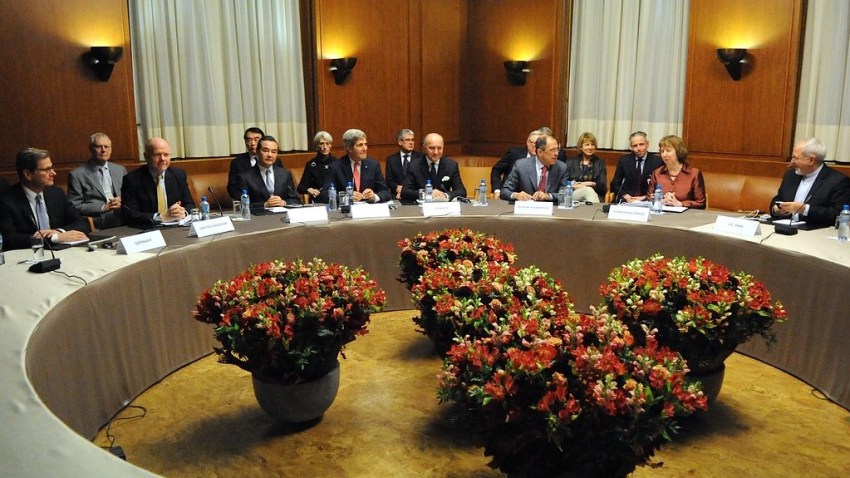After years of deadlocked negotiations and apparent inflexibility on the part of the Islamic Republic of Iran to make substantive concessions on its development of nuclear technology, some of which might be used for weapons, Tehran has recently become much more accommodating. The framework agreement
reached in November in Geneva, trading cessation of enrichment and dilution of existing stockpiles of enriched uranium for sanctions relief, will go into effect Jan. 20.
Is this newfound willingness to negotiate simply a result of personnel changes, beginning with the election of Hassan Rouhani as president? Not entirely. After all, Supreme Leader Ali Khamenei and a significant portion of the Iranian political and clerical elite who had previously opposed making concessions
now seem to quietly support the negotiating process—albeit with some attempts to spin the temporary agreement as a victory for Tehran.
Shifts in the international environment suggest possible explanations for the apparent decision by Iran’s leaders to change tack.
First, it is important to properly situate the nuclear program in Iranian politics. Mastering atomic technology is not an end in itself for Tehran but is directly tied to the larger objective of regime preservation. What appears to be occurring is a shift in the assessment of the utility of continuing to pursue nuclear objectives for meeting Iran’s security needs.
In that regard, Iran’s continued pursuit of nuclear technology and the perception among the U.S. and its allies of the government under former President Mahmoud Ahmadinejad as unwilling to negotiate, recalcitrant and even potentially reckless helped to solidify and strengthen the sanctions regime against Iran. The European lifeline that helped Iran mitigate the impact of unilateral U.S. sanctions was increasingly cut back during Ahmadinejad’s time in office, while even Russia and China agreed to a series of binding U.N.-based restrictions. A renewed U.S. willingness to pursue punitive measures against other states continuing to trade with Iran also led a number of Iran’s Asian trading partners to cut back on their commerce with Tehran.
The slow strangulation of economic sanctions has begun to bite—and a deteriorating domestic economy threatens the fundamental legitimacy of the regime. A willingness to talk and then to make concrete concessions, however, has opened up not only short-term sanctions relief but also put on the horizon potentially new lucrative contracts with Iran’s traditional Asian and European trading partners. In particular, getting sanctions lifted or significantly rolled back is the necessary precursor to bringing major new investment to a decrepit and deteriorating energy sector and ultimately to being able to trade more of that energy on global markets. Restoring Iran’s energy revenue streams could prove critical in future years both in shoring up the domestic bases of support for the regime but also in enabling the purchase of additional conventional defense equipment.
In addition, there have been dramatic changes in the regional security environment. Ten years ago, the United States appeared to be entrenched in Iraq, Afghanistan and Central Asia. Today, the military presence of the United States is receding; there was no extension of the status of forces agreement with Iraq to permit U.S. forces to stay beyond 2011, and the future of U.S. and NATO forces in Afghanistan following the announced 2014 drawdown is now in doubt. Washington’s willingness to engage in further military actions in the region is also diminishing; setbacks in Libya eroded enthusiasm for undertaking a more difficult campaign in Syria, even after President Barack Obama’s
“red line” concerning chemical weapons use was crossed.
This is not to suggest that a U.S.-led military strike against Iran is completely off the table, but Tehran feels much less encircled than it did a decade ago. Israel’s difficulties in coping with Hezbollah in Lebanon and Hamas in the Gaza Strip also indicate it will not be so easy to quickly and cheaply dislodge the Islamic Republic.
Ten years ago, the conventional wisdom was that only a credible nuclear program would deter U.S. military action. But the Syrian case suggests that strong conventional air defenses—along with war weariness in the United States—could also restrain Washington. Since weaponization is difficult and could still take years, compromising on the nuclear program to get sanctions rolled back or even lifted could be part of a strategy for Iran to gain access to more conventional weapons systems, particularly as countries like China develop more-robust anti-access capabilities that hold the promise of being able to deter the United States from considering military interventions.
Finally, there appears to be some horse trading between different Iranian factions. While Tehran has shown more willingness to talk about its nuclear program, it is plainly not interested in putting on the agenda its activities in the region, including its continued support for Syria and aid to substate proxies in Lebanon and Iraq. Iran’s current negotiating strategy on its nuclear program appears to be geared to delinking other issues from the talks, trading sanctions relief for verifiable steps on the nuclear issue alone. Indeed, while apparently blessing the talks in Geneva, the supreme leader several months ago
suggested that Iran is “challenging the influence of America in the region and is extending its own influence.”
Tehran has always sought to secure its regime from attack and to
diminish U.S. influence in the region. For years, the nuclear program was seen as part and parcel of that strategy. Today, however, that calculus seems to have changed.
Nikolas K. Gvosdev is the former editor of the National Interest and a frequent foreign policy commentator in both the print and broadcast media. He is currently on the faculty of the U.S. Naval War College. The views expressed are his own and do not reflect those of the Navy or the U.S. government. His weekly WPR column, The Realist Prism, appears every Friday.

